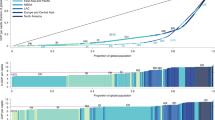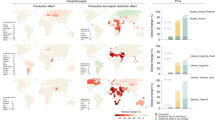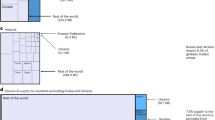Abstract
The Russia–Ukraine conflict has prompted calls for resource diversification and wheat self-sufficiency programmes in import-dependent regions. Here we show that this approach would have minimal impact on poor Nigerians as wheat constitutes only 4% of their total food consumption and 8% of their starchy staple consumption. In contrast, millets, rice, cassava and tubers are ten times more important—highlighting the need for careful consideration of country-context consumption patterns in response to external food system shocks.
This is a preview of subscription content, access via your institution
Access options
Access Nature and 54 other Nature Portfolio journals
Get Nature+, our best-value online-access subscription
$29.99 / 30 days
cancel any time
Subscribe to this journal
Receive 12 digital issues and online access to articles
$119.00 per year
only $9.92 per issue
Buy this article
- Purchase on Springer Link
- Instant access to full article PDF
Prices may be subject to local taxes which are calculated during checkout
Similar content being viewed by others

Data availability
The Nigeria LSMS—Integrated Surveys on Agriculture (LSMS—ISA) is publicly available from https://www.worldbank.org/en/programs/lsms/initiatives/lsms-ISA#34. The title and links for the four waves are shown in refs. 16,17,18,19.
Code availability
The data and code used for this study are also available and have been submitted to the journal.
Change history
18 April 2023
A Correction to this paper has been published: https://doi.org/10.1038/s43016-023-00758-1
References
Resnick, D. What does the war in Ukraine mean for Africa? Brookings https://www.brookings.edu/blog/africa-in-focus/2022/02/25/what-does-the-war-in-ukraine-mean-for-africa/ (2022).
African Development Bank Group. Ukraine war threatens food crisis and political upheaval across Africa, warns top economist. AfDB https://www.afdb.org/en/news-and-events/ukraine-war-threatens-food-crisis-and-political-upheaval-across-africa-warns-top-economist-50269 (2022).
Selassie, A. A. & Kovacs, P. Africa faces new shock as war raises food and fuel costs. The effects of the war in Ukraine leave policymakers with little room to maneuver. IMF Blog https://blogs.imf.org/2022/04/28/africa-faces-new-shock-as-war-raises-food-and-fuel-costs/ (2022).
Fleshman, M. Africa struggles with soaring food prices.From emergency reactions to farming investments. Africa Renewal https://www.un.org/africarenewal/magazine/july-2008/africa-struggles-soaring-food-prices (2008).
Reardon, T. Cereals demand in the Sahel and potential impacts of regional cereals protection. World Dev. 21, 17–35 (1993).
Kennedy, E. & Reardon, T. Shift to non-traditional grains in the diets of East and West Africa: role of women’s opportunity cost of time. Food Policy 19, 45–56 (1994).
Mason, N. M., Jayne, T. S. & Shiferaw, B. Africa’s rising demand for wheat: trends, drivers, and policy implications. Dev. Policy Rev. 33, 581–613 (2015).
Colussi, J., Schnitkey, G. & Cabrini, S. Argentina and Brazil could expand wheat production due to the war in Ukraine. farmdocDAILY https://farmdocdaily.illinois.edu/2022/04/argentina-and-brazil-could-expand-wheat-production-due-to-the-war-in-ukraine.html (2022).
Awokuse, T. et al. Agricultural Trade in Africa in an Era of Food System Transformation: Policy Implications (Alliance for a Green Revolution in Africa (AGRA), 2019); https://agra.org/wp-content/uploads/2019/09/AASR2019-The-Hidden-Middleweb.pdf
Lewbel, A. & Pendakur, K. Tricks with hicks: the EASI demand system. Am. Econ. Rev. 99, 827–863 (2009).
Zhen, C., Finkelstein, E. A., Nonnemaker, J. M., Karns, S. A. & Todd, J. E. Predicting the effects of sugar‐sweetened beverage taxes on food and beverage demand in a large demand system. Am. J. Agric. Econ. 96, 1–25 (2014).
Meyerhoefer, C. D., Ranney, C. K. & Sahn, D. E. Consistent estimation of censored demand systems using panel data. Am. J. Agric. Econ. 87, 660–672 (2005).
McCullough, E., Zhen, C., Shin, S., Lu, M. & Arsenault, J. The role of food preferences in determining diet quality for Tanzanian consumers. J. Dev. Econ. 155, 102789 (2022).
Zhen, C., Wohlgenant, M. K., Karns, S. & Kaufman, P. Habit formation and demand for sugar‐sweetened beverages. Am. J. Agric. Econ. 93, 175–193 (2011).
Dorosh, P. The Economics of Root and Tuber Crops in Africa: RCMP Research Monograph, No. 1 (CGIAR, 1988); https://hdl.handle.net/10568/98768
National Bureau of Statistics, Federal Republic of Nigeria. Nigeria General Household Survey (GHS), Panel 2010, Wave 1 Ref. NGA_2010_GHSP-W1_v03_M (World Bank, 2022); https://microdata.worldbank.org/index.php/catalog/1002
Nigeria National Bureau of Statistics (NBS). Nigeria GHS Panel 2012–2013, Wave 2. Ref. NGA_2012_GHSP-W2_v02_M (World Bank, 2022); https://microdata.worldbank.org/index.php/catalog/1952
Nigeria National Bureau of Statistics. GHS Panel 2015–2016. Ref. NGA_2015_GHSP-W3_v02_M (World Bank, 2022); https://microdata.worldbank.org/index.php/catalog/2734
Nigeria National Bureau of Statistics. GHS Panel 2018–2019. NGA_2018_GHSP-W4_v03_M (World Bank, 2022); https://microdata.worldbank.org/index.php/catalog/3557
Acknowledgements
We are grateful for comments by the reviewers, and for support from the US Agency for International Development Nigeria Agricultural Policy Activity, the US Department of Agriculture National Institute of Food and Agriculture, and MSU AgBioResearch (projects MIC02593 and MICL02532). The contents are the sole responsibility of the authors and do not necessarily reflect the views of the US Government or MSU AgBioResearch.
Author information
Authors and Affiliations
Contributions
L.S.O.L.-T. and T.R. conceptualized and designed the study. L.S.O.L.-T. obtained funding. C.M.P. and M.D. conducted the data analysis. L.S.O.L.-T. and T.R. drafted the manuscript. All authors read the final manuscript and approved its submission.
Corresponding author
Ethics declarations
Competing interests
The authors declare no competing interests.
Peer review
Peer review information
Nature Food thanks Valeria Pineiro and the other, anonymous, reviewer(s) for their contribution to the peer review of this work.
Additional information
Publisher’s note Springer Nature remains neutral with regard to jurisdictional claims in published maps and institutional affiliations.
Extended data
Supplementary information
Supplementary Data
Data used for the study.
Supplementary Code
Code for study replication.
Rights and permissions
Springer Nature or its licensor (e.g. a society or other partner) holds exclusive rights to this article under a publishing agreement with the author(s) or other rightsholder(s); author self-archiving of the accepted manuscript version of this article is solely governed by the terms of such publishing agreement and applicable law.
About this article
Cite this article
Liverpool-Tasie, L.S.O., Reardon, T., Parkhi, C.M. et al. Nigerians in poverty consume little wheat and wheat self-sufficiency programmes will not protect them from price shocks related to the Russia–Ukraine conflict. Nat Food 4, 288–293 (2023). https://doi.org/10.1038/s43016-023-00722-z
Received:
Accepted:
Published:
Issue Date:
DOI: https://doi.org/10.1038/s43016-023-00722-z
This article is cited by
-
Countries’ vulnerability to food supply disruptions caused by the Russia–Ukraine war from a trade dependency perspective
Scientific Reports (2023)
-
Wheat price hikes and food security in Sub-Saharan Africa
Nature Food (2023)


